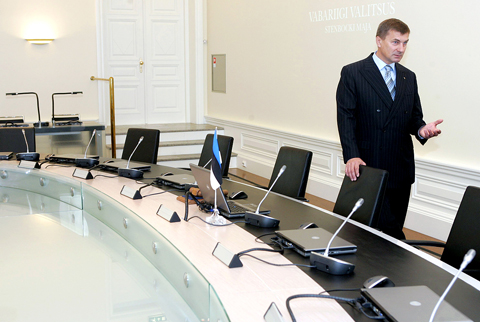IT titan Estonia is exporting its e-government technology and expertise across the globe, currently preparing new projects for the Palestinian territories, Afghanistan and Haiti.
The Baltic state of 1.3 million people has already helped fellow ex-communist democracies Armenia, Georgia and Moldova, plus a total of 40 states, to implement Internet-based government and services common in Estonia for years, but still not widely available elsewhere.
“It’s common to use all kind of Internet-based solutions here in Estonia, everywhere on the level of central government, the level of municipalities and of course business,” Estonia’s Prime Minister Andrus Ansip said recently, as he showed off the oval Cabinet table equipped with a shiny new laptop for each minister to a group of foreign journalists.

PHOTO: AFP
“The decision-making process thanks to this e-government system is much more transparent. Just a minute or two after the decision-making here, all the people around Estonia or around the world know what happened,” Ansip said.
Using special ID cards, Estonians can access virtually all public services via the Internet at the special site www.eesti.ee, including e-voting in national and local elections, as well as checking their medical and police records with a mouse-click.
Ninety-two percent of Estonian taxpayers filed annual income tax returns for last year via the Internet, while 79 percent do their banking online at least once a week, official statistics show.
After the end of five decades of Soviet rule in 1991, the minnow nation opted to go hi-tech as fast as possible and earned the nickname “E-stonia.”
Estonia, which joined the EU and NATO in 2004, is keen to export its e-government savvy — and associated transparency — around the globe with a special focus on developing democracies.
At the helm is the Tallinn-based e-Governance Academy.
Set up in 2002 by the Estonian government, the UN Development Program and the Open Society Institute, it is a non-governmental, non-profit organization, focused on the creation and transfer of Estonian knowledge concerning e-governance, e-democracy and the development of civil society. The Estonian state finances its projects.
The academy has announced it will help Afghanistan’s parliament create and implement a modern e-voting system and has been involved in bringing e-government to the Palestinian territories.
Since 2008, Estonia has allocated over 5 million kroons (US$390,000) for Palestinian projects, introducing IT equipment for central authorities, public e-services for residents as well as e-solutions in the education system and police force.
“We are very grateful for the help Estonia has provided for Palestine. Estonia has been a true success story in this area and we would like to be one day a similar success story in our region,” Palestinian Foreign Affairs Minister Riad al-Malki said during a recent visit to Estonia.
“Estonia’s experience has shown that implementing IT-technology helps to increase the openness of governance and to promote reforms better, and we are just happy when we can share our best practice this way with other states,” Estonian Foreign Minister Urmas Paet said.

The Central Weather Administration (CWA) yesterday said it expected to issue a sea warning for Typhoon Fung-Wong tomorrow, which it said would possibly make landfall near central Taiwan. As of 2am yesterday, Fung-Wong was about 1,760km southeast of Oluanpi (鵝鑾鼻), Taiwan’s southernmost point, moving west-northwest at 26kph. It is forecast to reach Luzon in the northern Philippines by tomorrow, the CWA said. After entering the South China Sea, Typhoon Fung-Wong is likely to turn northward toward Taiwan, CWA forecaster Chang Chun-yao (張峻堯) said, adding that it would likely make landfall near central Taiwan. The CWA expects to issue a land

Taiwan’s exports soared to an all-time high of US$61.8 billion last month, surging 49.7 percent from a year earlier, as the global frenzy for artificial intelligence (AI) applications and new consumer electronics powered shipments of high-tech goods, the Ministry of Finance said yesterday. It was the first time exports had exceeded the US$60 billion mark, fueled by the global boom in AI development that has significantly boosted Taiwanese companies across the international supply chain, Department of Statistics Director-General Beatrice Tsai (蔡美娜) told a media briefing. “There is a consensus among major AI players that the upcycle is still in its early stage,”

The Central Weather Administration (CWA) yesterday said it is expected to issue a sea warning for Typhoon Fung-wong this afternoon and a land warning tomorrow. As of 1pm, the storm was about 1,070km southeast of Oluanpi (鵝鑾鼻), Taiwan’s southernmost point, and was moving west-northwest at 28 to 32kph, according to CWA data. The storm had a radius of 250km, with maximum sustained winds of 173kph and gusts reaching 209kph, the CWA added. The storm is forecast to pass near Luzon in the Philippines before entering the South China Sea and potentially turning northward toward Taiwan, the CWA said. CWA forecaster Chang Chun-yao (張峻堯) said

PREPARATION: Ferry lines and flights were canceled ahead of only the second storm to hit the nation in November, while many areas canceled classes and work Authorities yesterday evacuated more than 3,000 people ahead of approaching Tropical Storm Fung-wong, which is expected to make landfall between Kaohsiung and Pingtung County this evening. Fung-wong was yesterday morning downgraded from a typhoon to a tropical storm as it approached the nation’s southwest coast, the Central Weather Administration (CWA) said, as it issued a land alert for the storm. The alert applies to residents in Tainan, Kaohsiung, Pingtung and Taitung counties, and the Hengchun Peninsula (恆春). As of press time last night, Taichung, Tainan, Kaohsiung, and Yilan, Miaoli, Changhua, Yunlin, Pingtung and Penghu counties, as well as Chiayi city and county had